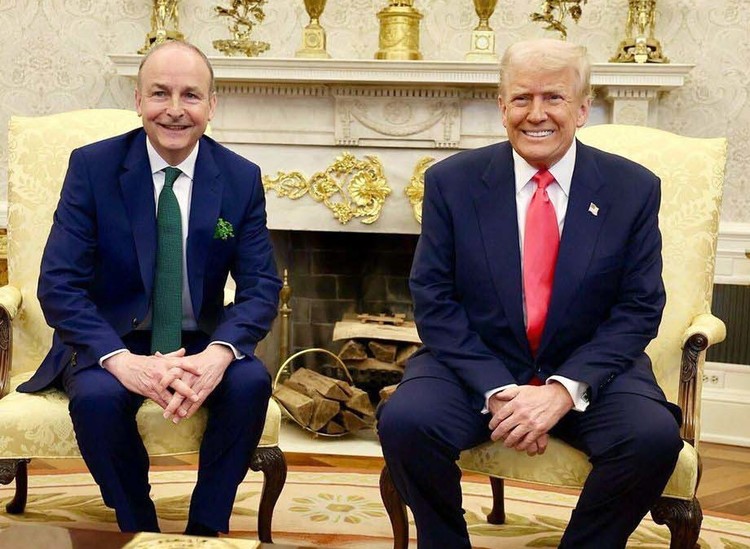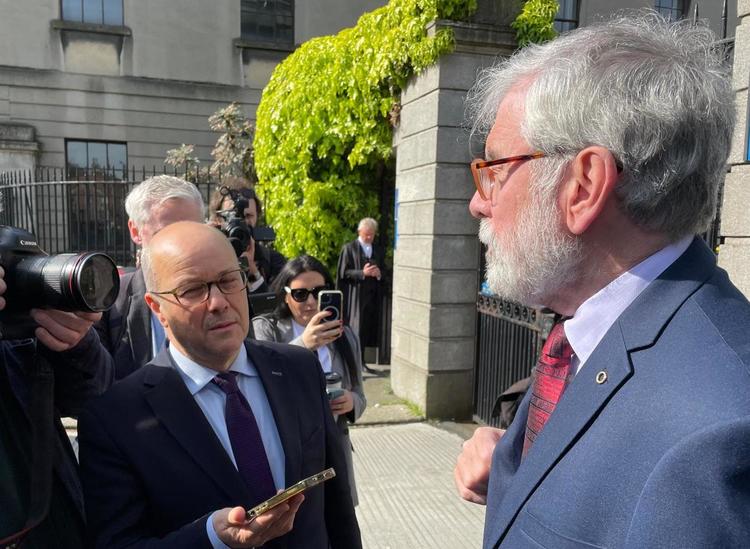The treeless plain of the Curragh was a notable feature of the journey.
PART 1
By Tom Phelan
Every summer we visited Dad’s sister Ellen, a nun whose religious name was Sister de Sales. Her convent was 52 miles from Mountmellick, in the village of Lucan, near Dublin.
In our house the word “Lucan” came to mean Aunt Ellen the same way “Derrycloney” meant Granny.
“There’s a letter from Lucan,” Mam would tell Dad.
“Did you write to Lucan?” Dad would ask Mam.
Aunt Ellen sent birthday presents to all her nieces and nephews, including my siblings and me. If the gift arrived too early, Mam hid it. After school on the birthday we would eat our fried bread and egg, and then we would parade in single file into the parlor for a party and the opening of the present. In our area most birthdays went by unnoticed, and only for Aunt Ellen ours would probably have slipped by without any fuss.
Around the parlor table we sat, the birthday child cradling Aunt Ellen’s parcel in defensive arms. Everyone got a Jacob’s Digestive Biscuit coated with chocolate on one side. Before Mam poured the brown, fizzing lemonade into the glasses that she got as a wedding present, she gave each one an inside wipe with the corner of her apron. The lemonade’s sharp bubbles brought tears to our eyes. We drank, we ate, and the present was opened and admired. Foreign fingers seeking to touch the gift were beaten back. When the celebration was over, we carried the glasses out to the kitchen and Mam cleaned the parlor table with a swipe of her apron.
One year Aunt Ellen sent me a Spitfire with a propeller that spun around when I flicked it with my fingernail. After my party, Dad called me out to the farmyard. I left the plane close to the fireplace on the little hob where our neighbor, Missus Fitz, sat when she came for her jug of milk every day. When I came back to the kitchen the propeller had melted. I cried.
The first book I ever read was a birthday gift from Aunt Ellen: “The Dog Crusoe and His Master” by R. M. Ballantyne. I still remember the first sentence: “The dog Crusoe was once a pup.”
During the school holidays, after the hay had been saved, Joe Shortall was hired to bring us in his car for the annual visit to Lucan. In the early morning, while Dad loaded laying ducks, a sack of potatoes, sheaves of rhubarb and a box of apples into the boot, we clamored into the motor car, into the unfamiliar smell and the soft seats. Weeks in advance of the trip the allotment of window seats and laps had been fought over and eventually agreed upon.
As we slowly pulled out of the farmyard onto the lane, we saw Missus Fitz hobbling over to the edge of her front yard. As we passed by she waved her handkerchief, we cheered through the open windows and Joe Shortall blew the horn.
Even though the steep and sharp-crested Carne Railway Bridge was still two miles away, Mam spread towels on laps. No matter how slowly the motor car went over the top, one of us threw up. Windows were wound down as Mam sealed the smelly towel into a crinkling sheet of butter paper and put it into a brown bag.
The Cockleshell House on the side of the road near Kildare both repelled and attracted at the same time; it was the witch who lived in it who had decorated it so beautifully. While the colored cement on the walls was still wet she had embedded seashells in it. The overlapping curlicues and van Gogh sunbursts, each in its own shape of shell, along with the bright greens and reds of the soffits and windows and door and garden gate, were tempting. But I knew the story of Hansel and Gretel and I knew who was inside the front door waiting to grab a boy and bake him in the oven.

A toy Spitfire was a well-remembered if delicate gift from Aunt Ellen.
On we drove at thirty miles an hour on the quiet road, the chatter in the car laced with “oohs” voiced at the strange sights
“There’s a train crossing a field real quick.”
“It’s on railway tracks.
“Here’s a lorry with a big load of hay. Look at the height of it.”
“Look, five horses in the same field.”
“There’s ripe wheat, Dad.”
”Why is theirs ripe and ours isn’t?”
“There’s mountains. What’s their name, Joe?”
“Here’s another car, Tom. How many’s that?”
The road slipped into the 5,000–acre, treeless plain of the Curragh, where the sheep-shorn grass stretched away to the horizon. The army’s headquarters were off to the right and the racecourse for the Grand National to the left. I knew that 1,500 years earlier, when Saint Brigid asked the local chief for a piece of land to build a church on, the chief laughed and said she could have as much land as her cloak covered. When Brigid placed the garment on the grass, it miraculously spread all over the Curragh. I always wondered what Brigid did with all that spare cloth.
One time, when Brigid saw a man passing her convent with a load of wattles for cabin-building, she asked him for some. He refused, so she miraculously paralyzed his horse. It wasn’t until the man gave her all his wattles that the horse could move again. I prayed that God would give me Brigid’s powers. If he did I would paralyze the bully Paddy Connors when he was torturing me in school. I would stand in front of him and twist his nose and twist his balls and squeeze his cheeks and make faces at him and slap his two ears at the same time and make him stupid like I saw happening in the pictures once, except for the twisting of the balls.
We knew Dublin was getting near when the first double-decker bus was spotted. Soon, we were breathing in the aroma of diesel fumes and the odors of the Liffey at low tide.
The best part of the visit to Aunt Ellen was the time we spent in Woolworths. Quivering with joy, like a fox and her kits coming across a stray gosling, we pulled on the parental verbal reins all the way down Henry Street.
“Niall, come back here!”
“Tom, stop pulling.”
My brothers and I spent our saved-up money on cap guns and other joys sent down by the gods; my sisters bought ribbons and colored pencils. In the Woolworth cafeteria we feasted on fat, bursting sausages, mashed potatoes and banana ice cream and then weighed ourselves on a scale with a face three feet wide.
We visited the Fun Palace on Burgh Quay and paid a penny to have our fortune told by a mechanical witch. As her lower jaw moved, a piece of paper came from her mouth with our futures mapped out on it. She told Lizzie she would marry a pig farmer and have seven children. Afterward, we galloped off to laugh at our misshapen bodies in the distorting mirrors.
Meanwhile, Dad, trapped in his best suit, shirt and tie and good boots, tried not to look impatient. Even though he did not begrudge us his hard-earned pennies, he probably found our wanton spending difficult to watch. Eventually, he left us in Mam’s charge while he strolled out to the Liffey where he leaned over the parapet and gazed at its muddy bottom with the stranded small boats leaning on their sides.
Leaving the Fun Palace, Mam led us to the river, she clutching Niall’s hand and the rest of us clutching our precious purchases. When we reached Dad he pointed out a small train going through a high door in the Guinness Brewery on the far side of the Liffey.
“All the people who work in Guinness’s are midgets,” he said, and for years I believed him.
Soon a short horn blast announced that Joe Shortall had arrived. We piled back into his motor car and headed off to Lucan.
For Part 2 click here.
© 2020 by Glanvil Enterprises, Ltd. Tom Phelan is the author most recently of the memoir “We Were Rich and We Didn’t Know It.” Go to tomphelan.net for more information.








